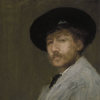James Whistler

James Whistler
James Abbott McNeill Whistlerwas an American artist, active during the American Gilded Age and based primarily in the United Kingdom. He was averse to sentimentality and moral allusion in painting, and was a leading proponent of the credo "art for art's sake". His famous signature for his paintings was in the shape of a stylized butterfly possessing a long stinger for a tail. The symbol was apt, for it combined both aspects of his personality—his art was characterized by a...
NationalityAmerican
ProfessionPainter
Date of Birth11 July 1834
CountryUnited States of America
Mauve is just pink trying to be purple.
You should not say it is not good. You should say you do not like it; and then, you know, you're perfectly safe.
Had silicon been a gas, I would have been a major general
It would have been called provincial and barbarous; it would have been cited as an incident of low civilization to confuse such art.
You shouldn't say it is not good. You should say, you do not like it; and then, you know, you're perfectly safe.
Can't a person be born where they want to be born?
As light fades and the shadows deepen, all petty and exacting details vanish, everything trivial disappears, and I see things as they are in great strong masses: the buttons are lost, but the sitter remains; the sitter is lost, but the shadow remains; the shadow is lost, but the picture remains. And that, night cannot efface from the painter's imagination.
A picture is finished when all trace of the means used to bring about the end has disappeared.
Art should be independent of all clap-trap - should stand alone, and appeal to the artistic sense of eye or ear, without confounding this with emotions entirely foreign to it, as devotion, pity, love, patriotism and the like. All these have no kind of concern with it; and that is why I insist on calling my works 'arrangements' and 'harmonies.
Frederic Leighton to James McNeill Whistler: 'My dear Whistler, you leave your pictures in such a sketchy, unfinished state. Why don't you ever finish them?' James McNeill Whistler to Frederic Leighton: 'My dear Leighton, why do you ever begin yours?
Over and over again did the Attorney-General cry out aloud, in the agony of his cause, 'What is to become of painting if the critics withhold their lash?
Truly color is vice! Of course, it can be, and has the right to be one of the finest virtues. Controlled by the strong hand and careful guidance of her Master drawing, color is a splendid Mistress, with a mate worthy of herself, her lover, but her Master likewise, the most magnificent Mistress possible, and the result is evident in all the glorious things that spring from their union.
Art is a goddess of dainty thought, reticent of habit, abjuring all obtrusiveness, purposing in no way to better others. She is, withal selfishly occupied with her own perfection only - having no desire to teach.
Paint should not be applied thick. It should be like a breath on the surface of a pane of glass.